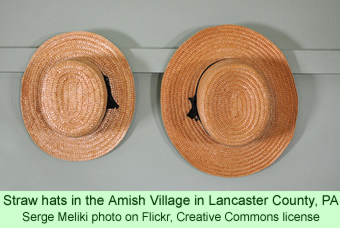The owner of a quarry in west central Pennsylvania has given up trying to overcome U.S. federal bureaucracy in order to protect the beliefs of his Amish employees. A couple news stories last week covered the controversy over whether or not Amish workers in the quarry had to remove their broad-brimmed hats and wear hard hats along with the other workers.
The Allentown Morning Call reported that last fall, Dan Russell contacted his congressman, Rep. Glenn Thompson, for his assistance in working out a seeming conflict between the regulations of two different U.S. government agencies. The owner of Russell Stone Products, a sandstone quarry located a few miles outside the borough of Grampian, in Clearfield County, Mr. Russell had allowed his five Amish employees to not wear hard hats while working in the quarry.
He felt that they were excellent employees and he believed that the regulations of the U.S. Occupational Safety and Health Administration (OSHA) applied to his workplace. Those regulations require the use of hard hats by workers in construction areas. However, the regulations allow exemptions for Amish workers whose religious beliefs require their men to all wear broad-brimmed straw or felt hats.
But officials at the U.S. Mine Safety and Health Administration have a different take on the safety of workers in quarries, which fall under their jurisdiction. That agency insists that all workers have to wear hard hats when they are working in areas of a mining operation where there is a danger of being hit by a falling object. Mr. Russell was notified that his Amish workers had to comply.
In order to not violate the law, he had to reassign the five men to another part of the quarry and replace them with non-Amish people—or face having his business shut down. He fails to understand the logic of allowing religious exemptions in construction areas but not in quarries. “What’s the difference if a piece of steel falls on your head versus a stone in our quarry?” he asked rhetorically.
Last year, Russell contacted Congressman Thompson, who in turn asked relevant officials in the U.S. Department of Labor to investigate. Officials there delayed responding to the congressman, but they finally got back to him—prompted by the Congressman’s repeating his question to Secretary of Labor Thomas Perez at a budget hearing on March 18. Four days later, the department officials ruled that the quarry owner must be guided by the mine safety regulations, not those of OSHA. The Amish workers must be transferred out of the areas where rocks might fall on them. Neither Mr. Russell nor Mr. Thompson plans to appeal the ruling.
The reporter contacted Donald Kraybill at Elizabethtown College to find out why the Amish men feel they must wear their broad brimmed hats. Kraybill indicated that wearing felt or straw hats is not optional for Amish men. It is an essential aspect of their culture, one which they are loath to change.
He said, “The Amish view their hat as a religious symbol and don’t want to acquiesce to outside requirements. They don’t want the loss of the hat in construction areas to lead to an erosion of wearing the hat elsewhere.”
Another news report covering the issue also quoted Kraybill as saying that the Amish see their manner of dressing as a way of expressing their commitment to Christianity. “It’s not a matter of personal preference or even tradition,” Kraybill said. “For them, it has religious mandate and religious meaning.”
In his book The Riddle of Amish Culture, Kraybill (1989) goes into a bit more detail about the threat, as the Amish perceived it, in the nineteen seventies when federal regulators were first proposing the requirement that all workers in construction industries must wear hard hats. Kraybill relates that a representative for the Amish National Steering Committee made several trips to Washington to plead the case for an Amish exemption.
That representative argued with regulators that for the Amish, their unique clothing, including their hats, are part of their witness against worldliness. Wearing the traditional hat is a religious belief for them, the person reportedly said. An Amish person who attended one of the meetings said that the Secretary of Labor at the time asked one of the Amish men in the room to pass his hat around the table.
When the hat reached the hands of the Secretary, he reportedly remarked, “That hat is pretty stiff by itself, it is no use in us fighting you. We’ll see what we can do (p. 59).” The decision at the time was that if Amish employees are willing to sign written waivers, they can be exempt from OSHA hard hat regulations. To judge by the news reports last week, OSHA still accepts the concept that, for the Amish, their clothing is a religious expression, though the other agency does not.
